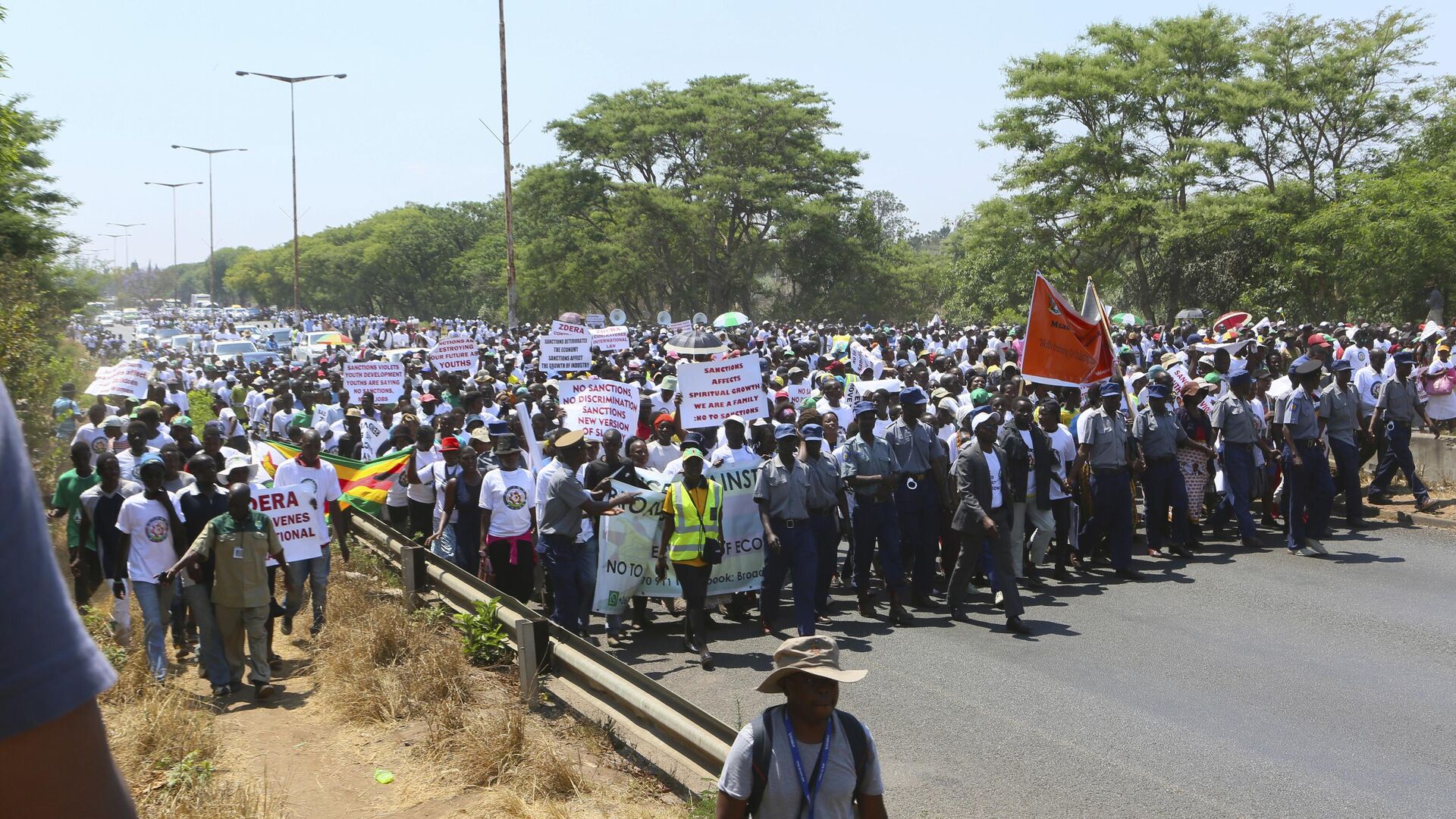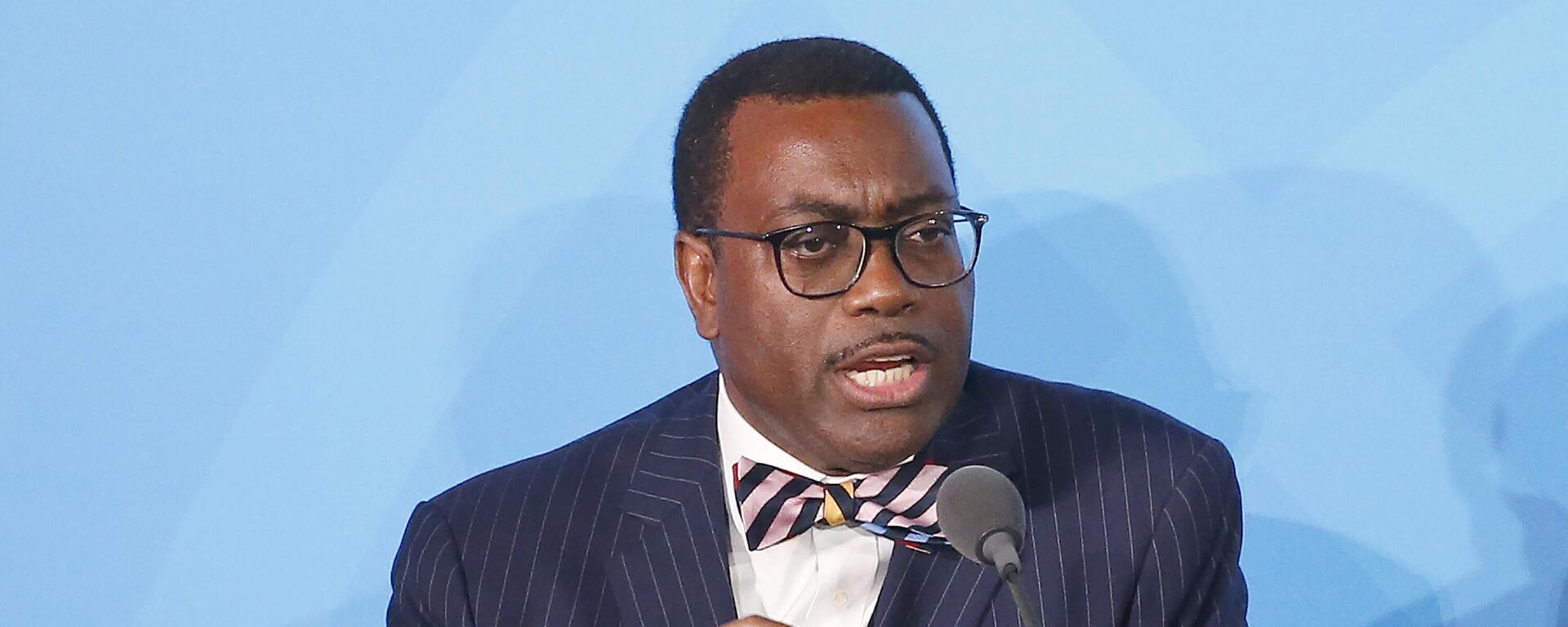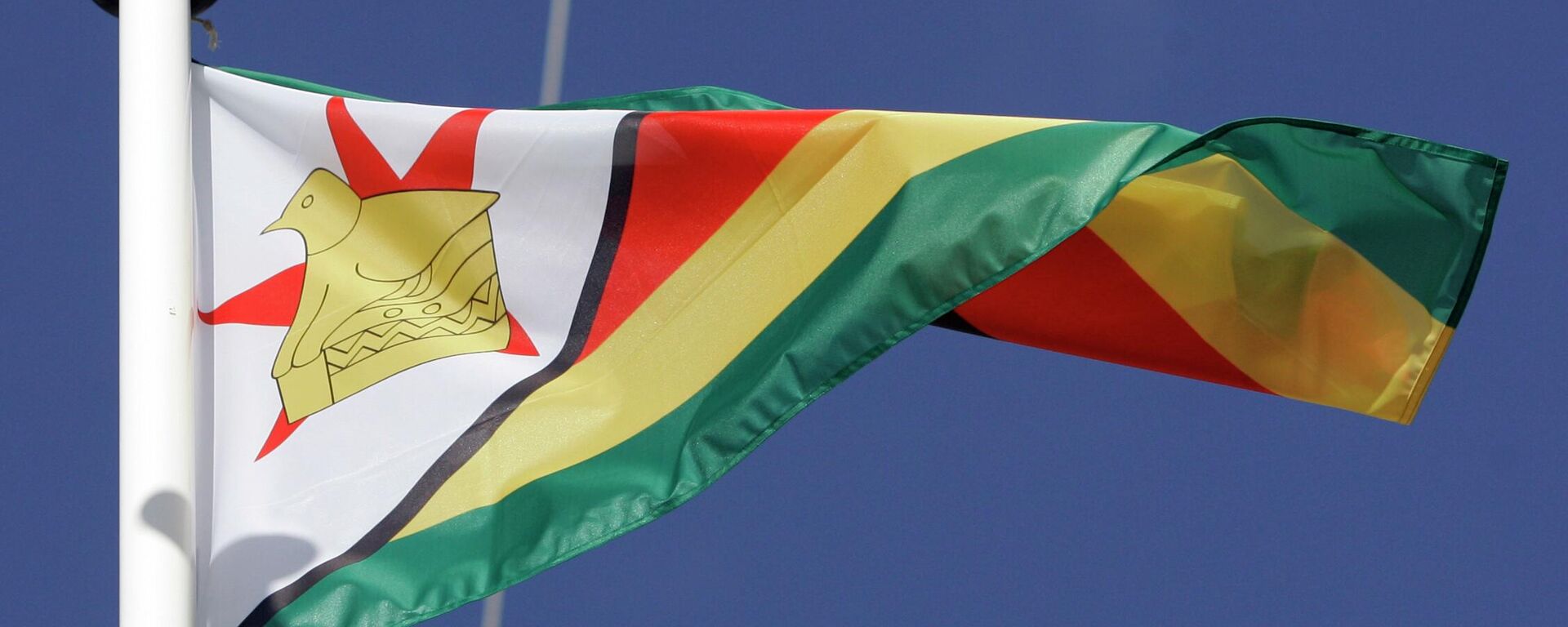https://en.sputniknews.africa/20230621/zimbabwean-sanctions-fighter-tells-us-youre-times-up-youre-bullyings-up-1060050175.html
Zimbabwean Sanctions Fighter Tells US: Your Time's Up, Your Bullying's Up
Zimbabwean Sanctions Fighter Tells US: Your Time's Up, Your Bullying's Up
Sputnik Africa
Zimbabwe has been under Western sanctions, particularly from the United States, the United Kingdom, and the European Union, for more than 20 years. These... 21.06.2023, Sputnik Africa
2023-06-21T11:26+0200
2023-06-21T11:26+0200
2023-06-21T12:54+0200
sub-saharan africa
southern africa
south africa
zimbabwe
us sanctions
sanctions
interview
https://cdn1.img.sputniknews.africa/img/07e7/06/15/1060059460_0:296:3072:2024_1920x0_80_0_0_afb89e7a6b1720599e1b72eed1f2caeb.jpg
The US-led Western sanctions have significantly impacted the lives of ordinary people in Zimbabwe. In effect since the early 2000s, the sanctions remain a significant obstacle to the country's progress, said Martin Zharare, the executive director of Citizens Against Economic Sanctions (CAES), an organization that advocates for the lifting of restrictions to ease the burden on the Zimbabwean people.In an interview with Sputnik Africa, Zharare said the anti-sanctions group seeks to educate people in Zimbabwe and around the world on how the US-led Western sanctions are impacting the lives of ordinary people nationwide, despite "serious misinformation" from the West that the measures target "only a few" government officials and not the entire country.Zharare noted that CAES has reached out to more than one million people in all of Zimbabwe's districts and provinces, and that the organization's activities are working towards telling the people the "real truth" about the US and EU economic sanctions against their country.'We Need to Keep on Putting Pressure'As part of its efforts to remove Western sanctions, the organization held a demonstration on October 25, 2022, in front of the US Embassy in the Zimbabwean capital, Harare, where more than 5,000 people signed a petition calling for the removal of "illegal sanctions" affecting the country's independence. CAES has since been collecting signatures for new petitions, and they are close to 400,000. They plan to present these petitions to the United Nations, the US Embassy in Harare, the British Embassy, the European Union offices in Harare and all other Western diplomatic missions in the country.Speaking about the implications of sanctions for ordinary Zimbabweans, Zharare explained that these restrictive measures by the West have had a devastating impact on the daily lives of ordinary people in the country.He emphasized that the sanctions are economic and have affected the whole country's economy. Life expectancy has dropped and unemployment has risen sharply since the sanctions were imposed.Before the sanctions, Zharare argued, Zimbabwe's educational sector was one of the best in Africa, producing highly-skilled graduates who were sought after by other countries. However, the brain drain caused by these sanctions and the lure of economic opportunities abroad has led to a significant loss of human capital, affecting the country's healthcare and other critical sectors.The suffering of Zimbabwe's citizens is also evident in the daily increases in inflation and living costs, impacting their day-to-day life. Farmers and industries are struggling to operate due to the imposed restrictions, further deteriorating the country's economic situation.Against All OddsDespite all the heavy burden from these punitive measures, Zimbabwe continues to make progress in terms of development, Zharare noted.He highlighted that Zimbabwe's construction industry is booming and the country is developing by relying on internal resources. According to him, the government of President Emmerson Mnangagwa has prioritized national development and new dams and roads are being built across the country.Zharare also said that people in Zimbabwe are "very thankful" to countries like Russia and China, as well as the BRICS economic bloc, for defending and helping the country overcome the effects of Western sanctions and continue its development.The CAES chief noted that with elections looming, Zimbabwe is under scrutiny from outside bodies that want to further weaken the economy. However, he believes that Zimbabweans are waking up to who is really destroying their country and are determined to continue their progress despite everything.The sanctions imposed on Zimbabwe have not only affected the Zimbabwean people, but also the populace in neighboring countries, and those of the Intergovernmental Authority on Development (IGAD) member states, according to Martin Zharare.He explained that when the sanctions set in, many Zimbabweans left the country and migrated to neighboring countries, which caused an influx of foreigners in those countries, impacting their social services, such as those at clinics and hospitals.As neighbors in this part of Africa, the member states are interconnected, so when Zimbabwe's economy suffers, so do its neighbors. Zimbabwe has been the breadbasket of Africa, and neighboring countries have benefited from its agricultural sector and past industrial prowess.Reasons Behind the Western SanctionsHe argued that the real reason for the sanctions is Zimbabwe's successful land reform program and the fact that the southern African country won the war against the colonizing British. He further added that the Americans are sticking to the sanctions in spite of international condemnation because they are controlling the UN.Zharare suggested that sanctions are being used by the West as a mechanism for changing governments and regimes they don't like.In conclusion, Zharare conveyed a message of gratitude to the world for standing with Zimbabwe during its struggles. Countries like Russia, China, and those in Latin America have provided crucial support in times of need, which has helped Zimbabwe weather difficult periods, he said.Zimbabweans will continue to strive towards growth and development with the help of their international partners.
https://en.sputniknews.africa/20230516/zimbabwe-sanctions-contribute-to-unsustainable-debt-increase-afdb-president-says-1059293924.html
https://en.sputniknews.africa/20230520/russia-supplies-zimbabwe-with-18-helicopters-for-disaster-management-and-police-1059366190.html
https://en.sputniknews.africa/20230531/zimbabwe-lashes-out-at-us-envoy-for-meddling-election-tweets-1059618427.html
southern africa
south africa
zimbabwe
Sputnik Africa
feedback@sputniknews.com
+74956456601
MIA „Rossiya Segodnya“
2023
Muhammad Nooh Osman
https://cdn1.img.sputniknews.africa/img/07e7/04/0a/1058467512_0:0:1280:1280_100x100_80_0_0_ec723833bcbfcaed2e21952965ad99e4.jpg
Muhammad Nooh Osman
https://cdn1.img.sputniknews.africa/img/07e7/04/0a/1058467512_0:0:1280:1280_100x100_80_0_0_ec723833bcbfcaed2e21952965ad99e4.jpg
News
en_EN
Sputnik Africa
feedback@sputniknews.com
+74956456601
MIA „Rossiya Segodnya“
Sputnik Africa
feedback@sputniknews.com
+74956456601
MIA „Rossiya Segodnya“
Muhammad Nooh Osman
https://cdn1.img.sputniknews.africa/img/07e7/04/0a/1058467512_0:0:1280:1280_100x100_80_0_0_ec723833bcbfcaed2e21952965ad99e4.jpg
southern africa, south africa, zimbabwe, us sanctions, sanctions, interview
southern africa, south africa, zimbabwe, us sanctions, sanctions, interview
Zimbabwean Sanctions Fighter Tells US: Your Time's Up, Your Bullying's Up
11:26 21.06.2023 (Updated: 12:54 21.06.2023) Muhammad Nooh Osman
Writer/Editor
Exclusive
Zimbabwe has been under Western sanctions, particularly from the United States, the United Kingdom, and the European Union, for more than 20 years. These restrictive measures were imposed under the pretext of alleged "human rights abuses" under the leadership of the late President Robert Mugabe.
The US-led Western sanctions have significantly impacted the lives of ordinary people in Zimbabwe. In effect since the early 2000s, the sanctions remain a significant obstacle to the country's progress, said Martin Zharare, the executive director of Citizens Against Economic Sanctions (CAES), an organization that advocates for the lifting of restrictions to ease the burden on the Zimbabwean people.
In an
interview with
Sputnik Africa, Zharare said the anti-sanctions group seeks to educate people in Zimbabwe and around the world on how the US-led Western sanctions are impacting the lives of ordinary people nationwide, despite "serious misinformation" from the West that the measures target "only a few" government officials and not the entire country.
"Because when they imposed sanctions, and they sponsored the sanctions in Zimbabwe, they are saying there are no sanctions in Zimbabwe, they are saying these sanctions are just targeted at a few people, our few leaders," he explained. "But when we did serious research, we discovered it was very serious misinformation. These sanctions are economic, these sanctions that are on our government, these sanctions are on our economy and the people need to be told that."
Zharare noted that CAES has reached out to more than one million people in all of Zimbabwe's districts and provinces, and that the organization's activities are working towards telling the people the "real truth" about the US and EU economic sanctions against their country.
"And the people are starting to say, 'Really?? We didn't know this is happening! We didn't know because when we go to social media, we are told there are no sanctions in Zimbabwe, it's corruption.' But now, a million people plus are waking up and America will soon realize that their chariot is coming to an end. The people are realizing the real truth," Zharare said.
'We Need to Keep on Putting Pressure'
As part of its efforts to remove Western sanctions, the organization held a demonstration on October 25, 2022, in front of the US Embassy in the Zimbabwean capital, Harare, where more than 5,000 people signed a petition calling for the removal of "illegal sanctions" affecting the country's independence.
However, Zharare revealed that there has been no response from the embassy or other concerned parties regarding the submitted petition.
CAES has since been collecting signatures for new petitions, and they are close to 400,000. They plan to present these petitions to the United Nations, the US Embassy in Harare, the British Embassy, the European Union offices in Harare and all other Western diplomatic missions in the country.
"America's got no right to sanction our country because we are an independent country. Their foreign policy is affecting everything that we are doing," Zharare stated. "We need to keep on putting pressure on the Americans, putting pressure on the EU, putting pressure on the United Nations so that they understand that this problem is affecting us."
Speaking about the implications of sanctions for ordinary Zimbabweans, Zharare explained that these restrictive measures by the West have had a devastating impact on the daily lives of ordinary people in the country.
He emphasized that the sanctions are economic and have affected the whole country's economy. Life expectancy has dropped and unemployment has risen sharply since the sanctions were imposed.
"We are in trouble here. We are in very big trouble here because these sanctions are real. These sanctions are economic. These sanctions are on our economy. And things are not going well the way they were before these sanctions were imposed," the CAES head said.
Before the sanctions, Zharare argued, Zimbabwe's educational sector was one of the best in Africa, producing highly-skilled graduates who were sought after by other countries. However, the brain drain caused by these sanctions and the lure of economic opportunities abroad has led to a significant loss of human capital, affecting the country's healthcare and other critical sectors.
The suffering of Zimbabwe's citizens is also evident in the daily increases in inflation and living costs, impacting their day-to-day life. Farmers and industries are struggling to operate due to the imposed restrictions, further deteriorating the country's economic situation.
Despite all the heavy burden from these punitive measures, Zimbabwe continues to make progress in terms of development, Zharare noted.
"We are a very resilient people," the executive director of CAES said. "Zimbabweans are people who will stand and work hard. We are hard workers in general. If you look at our country, you will be surprised when you come here. You won't believe that this country is under such a heavy wage of sanctions."
He highlighted that Zimbabwe's construction industry is booming and the country is developing by relying on internal resources. According to him, the government of President Emmerson Mnangagwa has prioritized national development and new dams and roads are being built across the country.
Zharare also said that people in Zimbabwe are "very thankful" to countries like Russia and China, as well as the BRICS economic bloc, for defending and helping the country overcome the effects of Western sanctions and continue its development.
"We are now developing our country, and also we are very thankful to countries like Russia. You know, Russia has been with us since the days of the liberation struggle," he said. "We are very grateful to countries like China. China has been with us and China is still with us. Russia is still with us. And those friends have been helping us, you know, with their technology, with everything."
The CAES chief noted that with elections looming, Zimbabwe is under scrutiny from outside bodies that want to further weaken the economy. However, he believes that Zimbabweans are waking up to who is really destroying their country and are determined to continue their progress despite everything.
"So we are moving forward and we are rebuilding our country. And, you know, it is a shock to them to see Zimbabwe still standing after 22 years of sanctions, and they are devising each and every way to destroy us," the CAES chief suggested.
The sanctions imposed on Zimbabwe have not only affected the Zimbabwean people, but also the populace in neighboring countries, and those of the Intergovernmental Authority on Development (IGAD) member states, according to Martin Zharare.
He explained that when the sanctions set in, many Zimbabweans left the country and migrated to neighboring countries, which caused an influx of foreigners in those countries, impacting their social services, such as those at clinics and hospitals.
As neighbors in this part of Africa, the member states are interconnected, so when Zimbabwe's economy suffers, so do its neighbors. Zimbabwe has been the breadbasket of Africa, and neighboring countries have benefited from its agricultural sector and past industrial prowess.
Reasons Behind the Western Sanctions
"The Americans are bullies. The Americans are very bad people. And the Americans will tell you that they put sanctions on Zimbabwe because of human rights abuses. But that is, you know, not the real reason why they sanctioned our country," Zharare argued.
He argued that the real reason for the sanctions is Zimbabwe's successful land reform program and the fact that the southern African country won the war against the colonizing
British. He further added that the
Americans are sticking to the sanctions in spite of international condemnation because they are controlling the UN.
Zharare suggested that sanctions are being used by the West as a mechanism for changing governments and regimes they don't like.
"These sanctions are being used as a regime change by the Americans and the British and Australians, the Canadians and actually everybody. It is only the people of China and the Russians who are supporting us, who really know what America is up to," he stated.
In conclusion, Zharare conveyed a message of gratitude to the world for standing with Zimbabwe during its struggles. Countries like Russia, China, and those in Latin America have provided crucial support in times of need, which has helped Zimbabwe weather difficult periods, he said.
Zimbabweans will continue to strive towards growth and development with the help of their international partners.
"And the biggest message I'd like to send to America is, 'your time is up'. Your time of bullying and of destroying other countries, destroying the sovereignty of our nations is up. The world is waking up," he said. "And to the policymakers in America, your sanctions are coming back to hit you, because the sanctions have actually made our people in Zimbabwe to stand up and to start to work hard for themselves."





